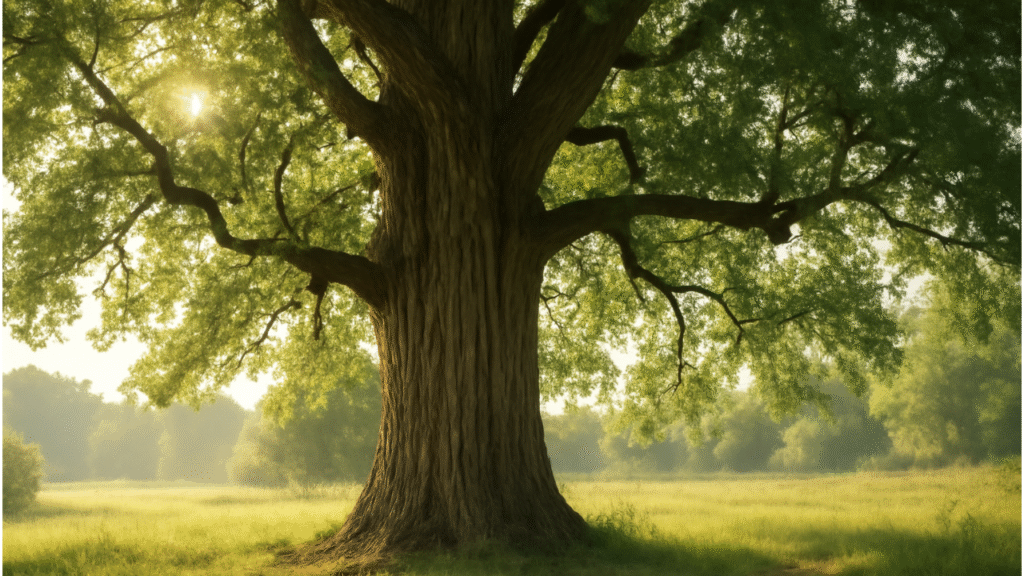
How to Identify and Care for an Old Hickory Tree: Expert Tips for Longevity and Health
🌳 Have you ever wondered how to properly care for an old hickory tree? These majestic giants, with their rough bark and towering height, bring both beauty and value to any landscape. However, as they age, old hickory trees can face unique challenges that require special care to ensure their health and longevity.
While hickory trees are known for their resilience, the needs of an older tree are different from those of a younger one. 🌱 Without proper maintenance, issues like disease, pests, and environmental stress can shorten their lifespan. That’s why it’s crucial to know how to identify and care for an old hickory tree before problems arise.
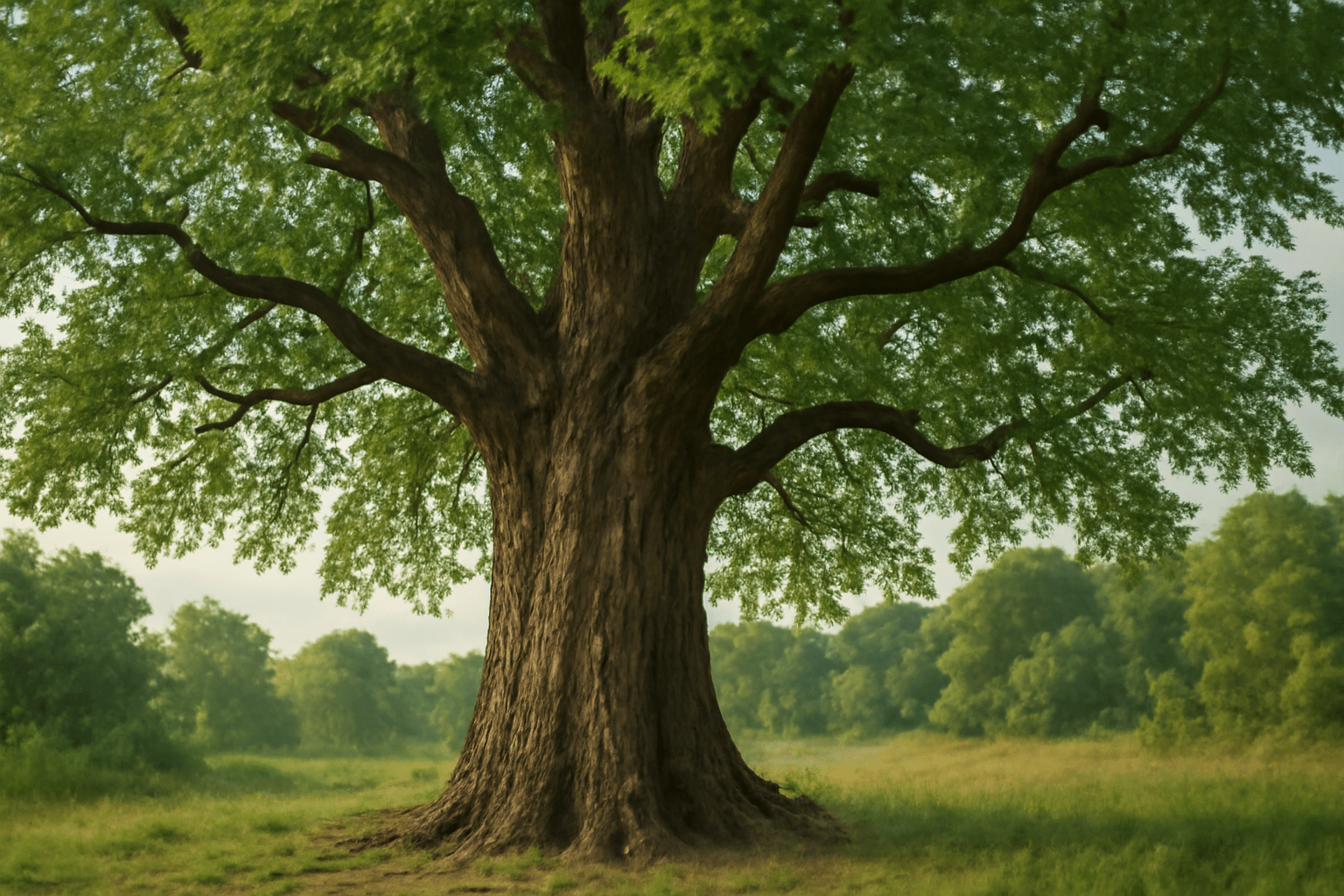
In this guide, we’ll walk you through everything you need to know to help your hickory thrive for years to come. From identifying its age to understanding the best care practices, we’ve got you covered with expert tips that make tree care simple and effective. Ready to help your old hickory tree live its best life? Let’s dive in! 🌿
Table of Contents
Toggle🌳✨ What Is an Old Hickory Tree? ✨🌳
An old hickory tree is more than just a tall, sturdy tree 🌲—it’s a living piece of history 📜. These trees can grow for hundreds of years, becoming an iconic part of your landscape 🌳. But what makes a hickory tree “old,” and how can you recognize one? Let’s break it down! 🔍
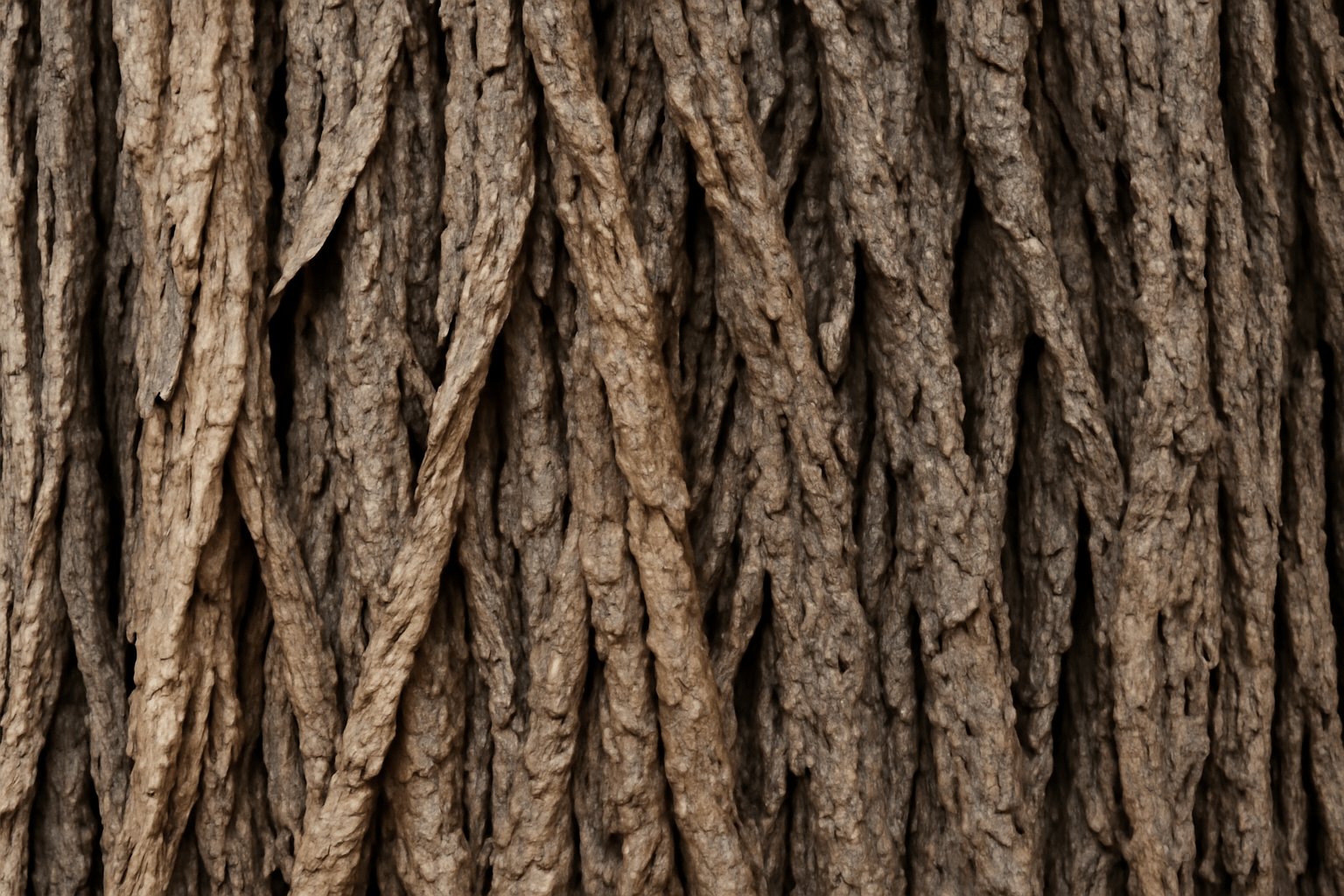
🌿 Defining an Old Hickory Tree 🌿
An old hickory tree 🌳 is typically over 100 years old 🎂, although some species can live even longer ⏳. As they age, they grow much larger than their younger counterparts 🌱, often reaching impressive heights of 100 feet or more 🌲.
Old hickories have distinctive characteristics that set them apart from younger trees 🌿:
- Rough, Shaggy Bark 🌳: The bark becomes deeply furrowed and peels in long strips—making the tree look almost “shaggy” or “peeling” with age 🍂.
- Thick, Spreading Canopy 🌳: With time, old hickory trees develop large, spreading canopies 🌳 that provide plenty of shade 🏖️ and shelter for wildlife 🦋.
- Sturdy, Strong Roots 🌱: Their roots go deep and wide 🌿, anchoring them firmly in the soil 🌍, making them resilient in various weather conditions 🌪️.
🌳 Types of Hickory Trees 🌳
Not all hickory trees are the same! 🌲 There are several species of hickories 🌳, each with its own unique characteristics ✨. Some of the most common types include:
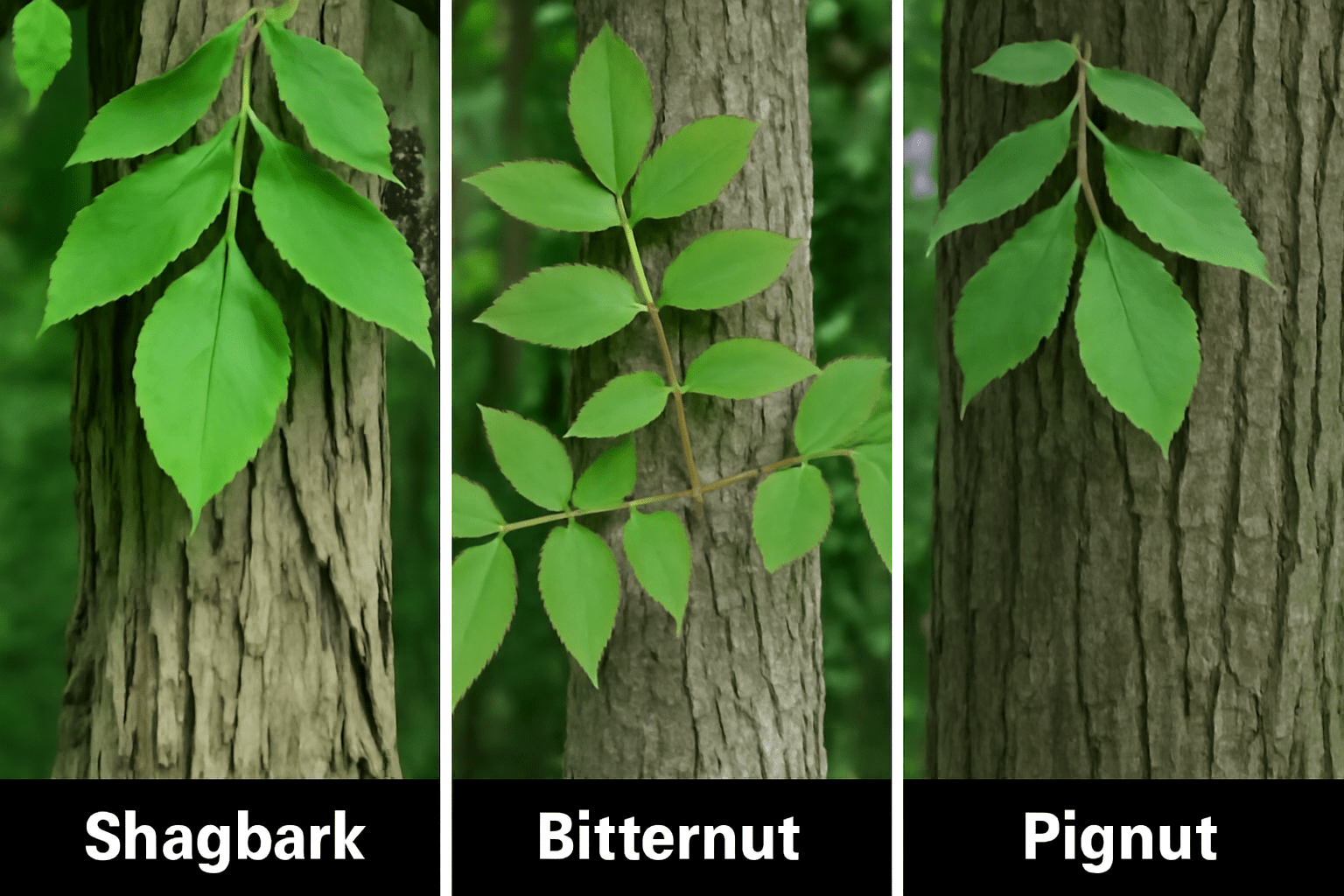
- Shagbark Hickory 🌳: Known for its peeling bark, this is the most commonly recognized “old” hickory tree 🌿.
- Bitternut Hickory 🌰: This species has a smoother bark and a yellowish tint to its buds 🌿. It’s also a valuable tree in the forest 🌲 for its hard, dense wood 🌳.
- Pignut Hickory 🌳: Slightly smaller in size, but still an impressive tree 🌲, especially in hardwood forests 🌳.
🌱 Why Does Age Matter? 🌱
As a hickory tree ages 🌳, it faces different challenges and opportunities for growth 🌱:
- Slow Growth ⏳: Older trees grow more slowly, but their trunks become thicker 🌳, and their branches more widely spread 🌲.
- Unique Health Considerations 🧑⚕️: An old hickory requires more care 💚, especially regarding soil health 🌍, water management 💧, and pest control 🐞.
- Environmental Impact 🌎: These trees play an important role in ecosystems 🌿, providing shelter 🏡 for wildlife 🦋 and contributing to carbon sequestration 🌱.
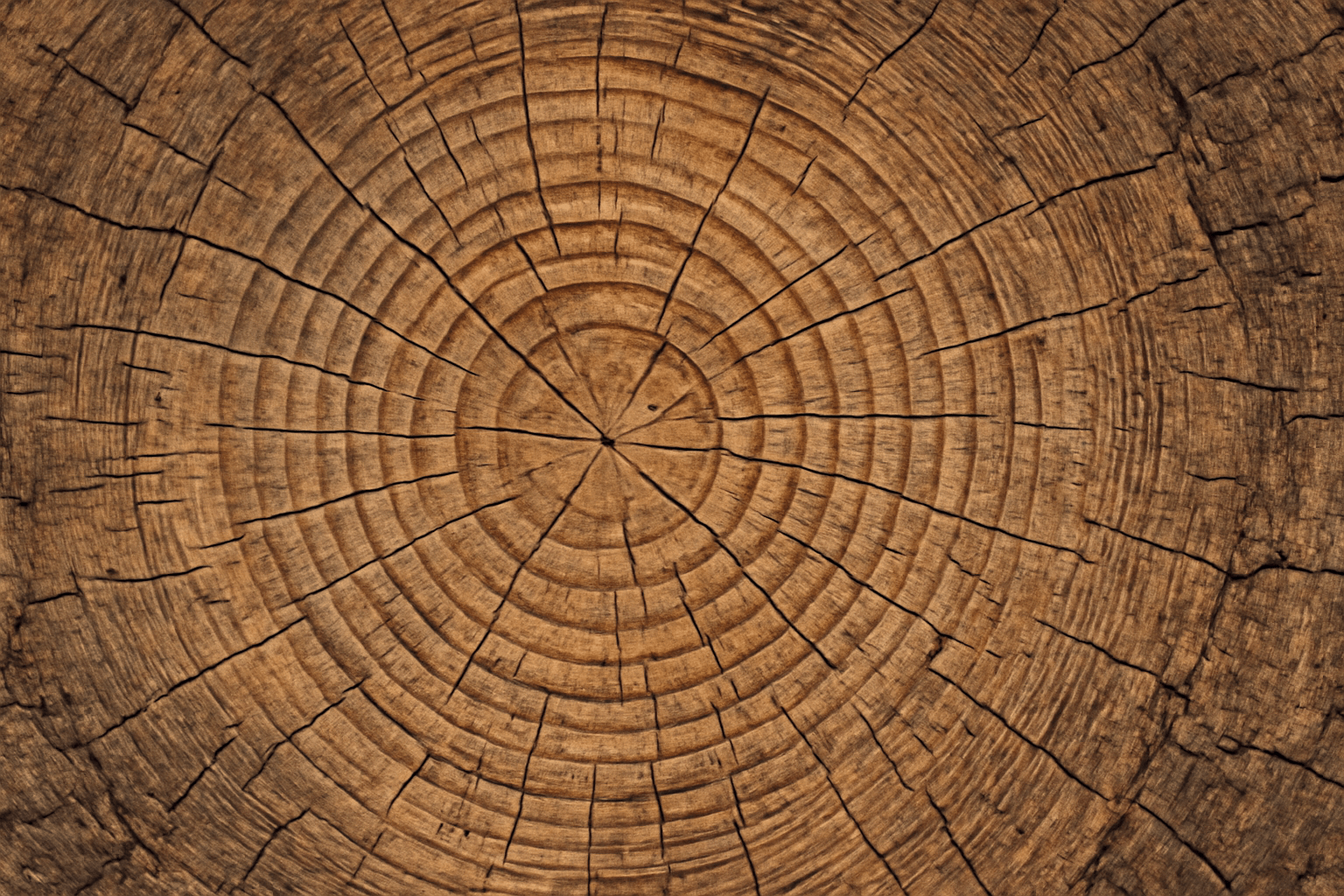
Understanding what makes an old hickory tree special 🌳 helps you identify one in your yard 🌻 or local area 🏞️, and more importantly, gives you the tools you need to properly care for it 🌱. 💚
By knowing how to spot the signs of an aging hickory 🌳, you’ll be equipped to help this magnificent tree thrive 🌿 for generations to come 🌱.
🌳✨ Identifying an Old Hickory Tree ✨🌳
Identifying an old hickory tree isn’t just about size 🌱—it’s about the unique features that come with age! 🕰️ In this section, we’ll walk you through the visual characteristics 🌿 that make an old hickory stand out, plus some tips to help you distinguish it from younger trees 🌳.
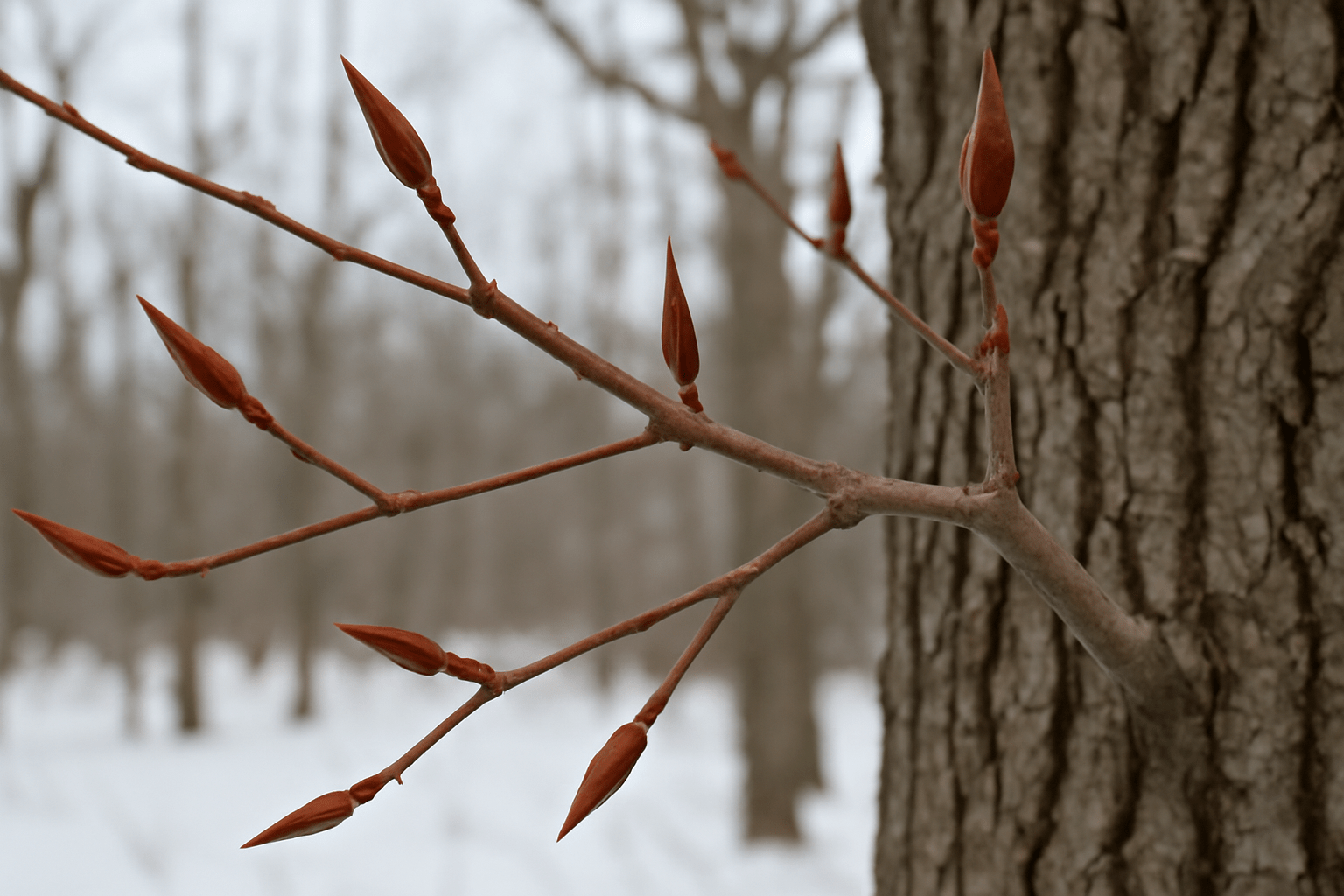
🌿 Visual Characteristics 🌿
🌳 Bark 🌳
The bark of an old hickory tree 🌳 has a rough, shaggy appearance 🌿. It becomes deeply furrowed with age 🌱, forming long, peeling strips that make it look almost like it’s wearing a rough coat 🧥. This texture is one of the most noticeable features of older hickory trees 🌲.
Tip: If the bark is smooth or only lightly furrowed, the tree is likely younger! 🌿
🍃 Leaves 🍃
Old hickory trees have long, compound leaves 🍃 with sharp teeth along the edges ✂️. These leaves are dark green in the summer ☀️ and turn a golden yellow in the fall 🍂.
Tip: Look for a leaf with 5-9 leaflets attached to a central stem 🌱. If the tree has large, jagged leaves 🌿, it’s likely an old hickory! 🌳
🌲 Twigs and Buds 🌲
In the winter months ❄️, identifying a hickory tree can be tricky 🤔, but the twigs and buds offer key clues 🔑.
- Twigs: They are slender, reddish-brown 🌰, and covered in small, fine hairs 🌱.
- Buds: Hickory tree buds are long, pointed 🔺, and brown 🍂, often with a slightly reddish hue 🌹.
Tip: In winter ❄️, examine the buds closely 👀—if they’re slender and pointed 🌱, you’re likely looking at a hickory 🌳.
📏 Size 📏
An old hickory tree 🌳 is impressive in size! 🌲 They can reach heights of 100 feet or more 🌳 and have a wide, spreading canopy 🌳.
Tip: If the tree towers above others in the area 🏞️ and provides significant shade 🌞, it’s likely an old hickory 🌳.
🌰 Fruit (Nuts) 🌰
One of the most distinctive features of a hickory tree 🌳 is its nuts 🌰. These nuts are small, round 🔵, and encased in a hard, woody shell 🪵. The nuts fall in the late summer 🌞 or fall 🍁, and they often have a strong, slightly sweet smell 🍯.
Tip: If you find nuts 🌰 that are smooth and round with a hard outer shell 🪶, you’ve likely found a hickory tree! 🌳
🌿 Distinguishing Features of an Old Hickory Tree 🌿
Differences Between Young and Old Hickory Trees 🌳
As hickory trees age 🕰️, their appearance changes significantly 🔄. Here’s what to look for:
- Bark Texture: Young hickories have smooth bark 🌱 that becomes rough and shaggy as they grow older 🌳.
- Growth Rate: Old hickory trees grow slower 🐢 than young ones 🌱, so if the tree has reached impressive heights 🌲 over a long period, it’s likely old 🌳.
- Leaf Size: As hickory trees age 🌳, their leaves may become smaller 🍂 or more sparse 🌿 due to the tree’s slower growth rate 🐢.
🌲 The Importance of Tree Rings 🌲
To definitively confirm the age 🕰️ of a hickory tree 🌳, tree rings are the most reliable method 🌱.
How to Use Tree Rings 🔍
By removing a small core sample from the tree 🌳 (called tree coring), you can count the rings to determine its exact age 🔢.
Tip: Counting the rings is an accurate way to tell the age of a tree 🌳, but it requires specialized tools 🛠️ and should be done carefully to avoid harming the tree 🌱.
By observing these key characteristics 👀, you can confidently identify whether the hickory tree 🌳 you’re looking at is an old one 🕰️. Whether you’re admiring its beauty 🌿 or planning care strategies 🌱, these features will guide you in recognizing the unique traits of a mature hickory tree 🌳!
🌳✨ Common Problems Faced by Old Hickory Trees ✨🌳
Old hickory trees 🌳 are magnificent, but like any aging organism, they can face a variety of challenges ⚠️. From diseases 🦠 to pests 🐞, and environmental stress 🌦️, understanding these issues is key to preserving the health and longevity of your tree 🌿. In this section, we’ll cover some of the most common problems old hickory trees encounter and how to spot them early 👀.
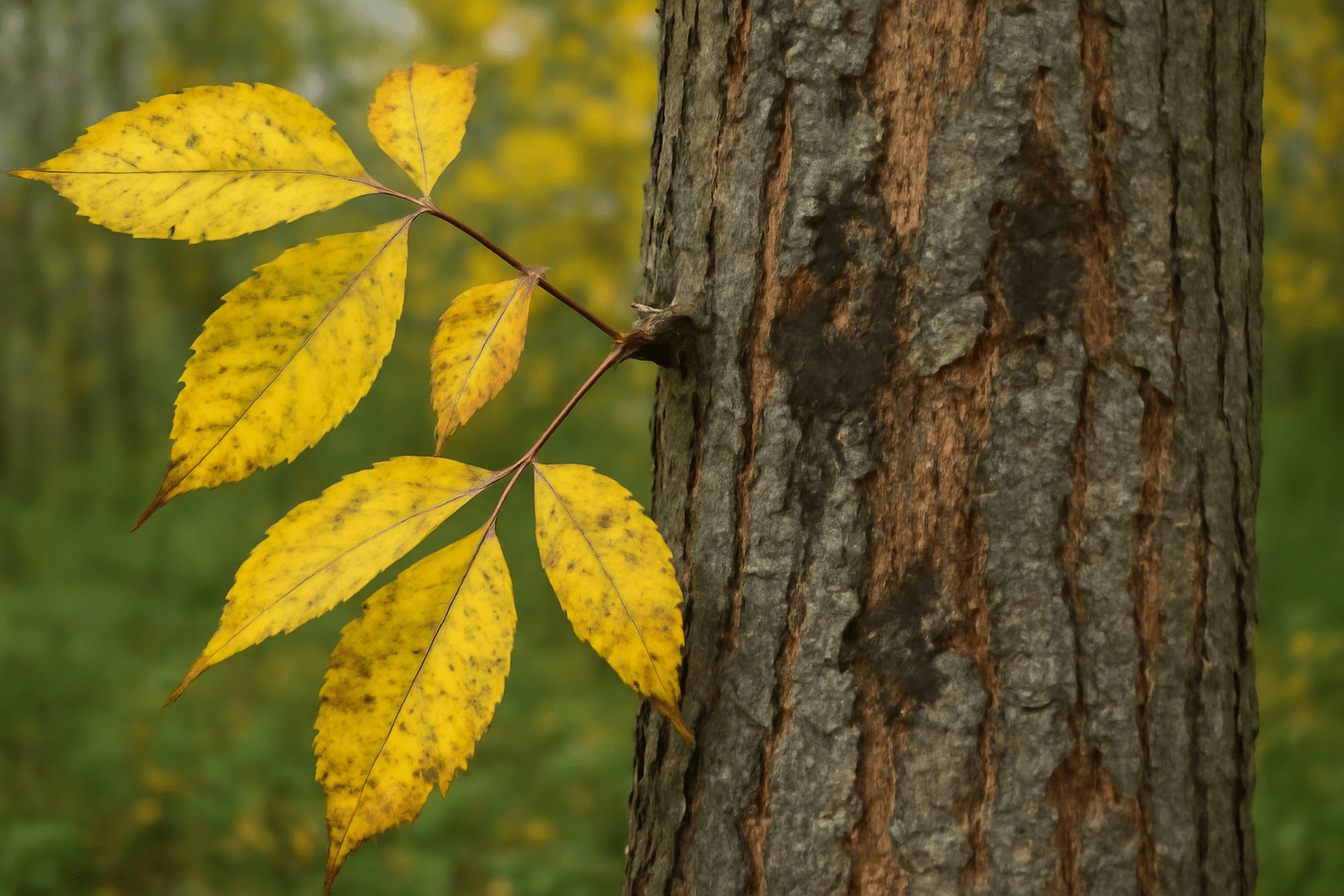
🌿 Health Issues and Pests 🌿
🦠 Diseases 🦠
As hickory trees age 🕰️, they become more susceptible to diseases 🦠. Some of the most common diseases affecting old hickories 🌳 include:
- Hickory Dieback 🌿: This disease causes the branches and leaves of the tree to wither and die 🌱. It’s typically caused by fungal infections 🦠 or environmental stress 🌞.
- Canker Diseases 🦠: These are fungal infections that cause sunken, discolored areas on the bark 🌳 and can lead to branch dieback 🪓.
- Powdery Mildew 🦠: This fungal disease causes a white, powdery coating on leaves 🍃 and can weaken the tree if left untreated 😓.
Tip: Look for discolored, wilting 🌿, or deformed leaves 🍃, and dark, sunken areas on the bark 🌳 to spot these diseases early 🕵️♂️.
🐞 Pests 🐞
Older hickory trees often attract pests 🐜 that can compromise their health 🌳. Two common pests 🐞 that affect hickories 🌳 include:
- Hickory Borer 🪲: This beetle larvae 🐛 burrow into the tree’s bark 🌳 and wood 🪵, weakening the structure of the tree over time 🕰️.
- Caterpillars 🐛 and Aphids 🐜: These insects 🦋 feed on the leaves 🍂 and sap 🌱 of the tree, potentially causing defoliation 🍃 and weakening the tree’s defenses 🌳.
Tip: If you notice holes in the bark 🌳 or yellowing leaves 🍂, it’s worth inspecting the tree for pests 🐞. Insects such as the hickory borer 🪲 often leave visible damage 🕵️♂️.
🌿 Environmental Stress 🌿
🌱 Root Rot 🌱
Old hickory trees 🌳 are particularly susceptible to root rot 🦠, especially when the tree is growing in poorly drained soil 🌱 or during periods of heavy rainfall 🌧️. Root rot occurs when fungi invade the roots 🦠, causing them to decay and making it harder for the tree to absorb nutrients 🥦.
Tip: Look for signs like wilting 🌿, yellowing leaves 🍂, or a soft, spongy texture around the tree’s base 🌳 to spot root rot early 🕵️♂️.
🌞 Drought Stress 🌞
Though hickories 🌳 are fairly drought-tolerant 🌵, prolonged dry spells 🌞 can still stress old trees 🌱, causing leaves to curl 🍂, turn brown 🌰, and drop prematurely 🍃.
Tip: Ensure your tree 🌳 is receiving consistent moisture 💧, especially during dry periods 🌞. Water deeply 🌿 to encourage deep root growth 🌱.
🏞️ Soil Compaction 🏞️
Over time 🕰️, foot traffic 🚶♂️, construction 🏗️, or other human activity near the base of the tree 🌳 can compact the soil 🌱, restricting root growth 🪴 and oxygen flow 🌬️. Compacted soil also makes it harder for water 💧 to penetrate the ground 🌍.
Tip: Avoid disturbing the soil around the tree’s root zone 🌳, and if compaction occurs, consider aerating the soil 🌱 to improve root health 🌿.
🌿 Decreased Vitality with Age 🌿
🐢 Slower Growth 🐢
As hickory trees age 🌳, they naturally slow down their growth rate ⏳. You may notice fewer new branches 🌱, smaller leaves 🍂, and less vibrant foliage 🌿.
Tip: Slow growth is normal in old trees 🌳, but if the tree seems to stop growing altogether ❌, it could indicate underlying health issues like nutrient deficiency 🥦 or poor soil conditions 🪴.
🌳 Weakened Structure 🌳
With age 🕰️, the structural integrity of the tree can weaken 💪. The tree may become more prone to breaking 🌿, especially during storms ⛈️ or strong winds 💨.
Tip: Regularly inspect the tree for cracks in the bark 🌳 or unstable branches 🌿. If large branches appear weak 🐦, consult an arborist 🌳 for pruning ✂️ or additional support 💪.
By recognizing these common problems early 👀, you can take proactive steps to protect your old hickory tree 🌳. Regular monitoring 📅, proper care 🌱, and early intervention 🛠️ can help extend the life 🌱 of your tree 🌳, allowing it to continue thriving 🌿 for generations to come 🌳!
🌳✨ How to Care for an Old Hickory Tree ✨🌳
Caring for an old hickory tree requires a bit more attention than younger trees 🌳, but with the right approach 👍, you can ensure that your tree remains healthy 🌱 and continues to thrive 🌿. In this section, we’ll walk you through the best practices for maintaining the health of an old hickory tree 🌳, from pruning ✂️ to watering 💧 and pest control 🐞.
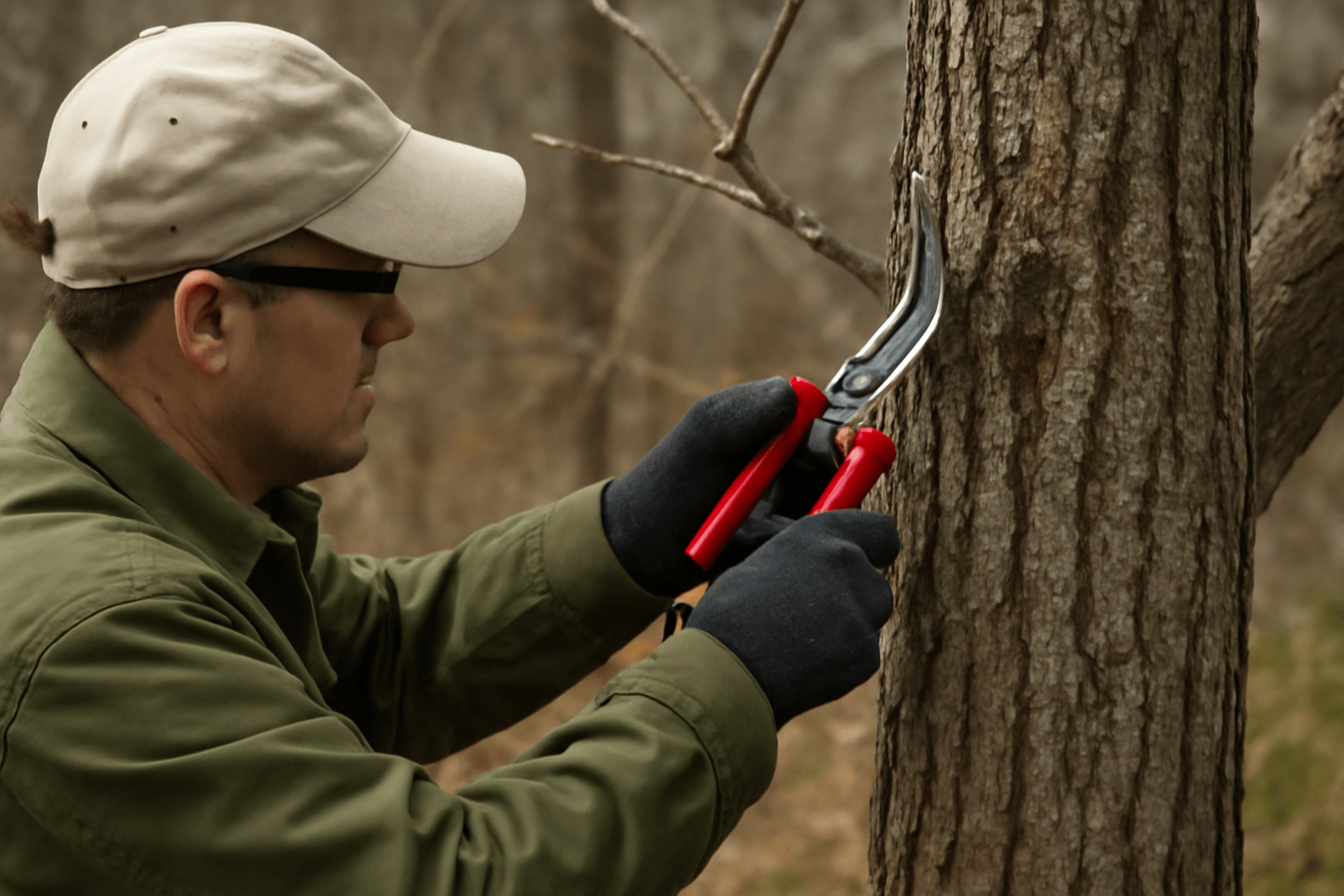
🌿 Pruning and Maintenance 🌿
🗓 When to Prune 🗓
The best time to prune an old hickory tree 🌳 is during late winter or early spring 🌸, before the tree starts to produce new growth 🌱. This is when the tree is dormant 💤, which helps minimize stress 😌 and prevents sap from leaking out 🌱.
Tip: Avoid pruning during the growing season 🌞, as it can weaken the tree 🌳 and expose it to disease 🦠.
✂️ How to Prune ✂️
When pruning 🌿, focus on removing dead, diseased, or damaged branches 🪓 first. Be sure to make clean cuts 🔪 to avoid injuring the tree 🌳. For larger branches 🌲, use the three-cut method to prevent the bark from tearing 🌳.
Tip: Always cut branches at the branch collar (the raised area where the branch meets the trunk) 🌳 to promote healing 💚 and reduce the risk of disease 🦠.
🪓 Removing Deadwood 🪓
Deadwood can attract pests 🦠 and diseases 🦠, so it’s important to remove it regularly 🌱. Look for branches with no leaves 🍂, dry twigs 🌿, or blackened areas 🌑, which could indicate the presence of disease 🦠 or rot 🦠.
Tip: If you’re unsure which branches to remove ❓, consult an arborist 🌳 for a professional assessment 👨⚕️.
🌿 Watering and Fertilizing 🌿
💧 Proper Watering 💧
Old hickory trees 🌳 need deep watering 💧, especially during dry spells 🌞. Shallow watering 🌊 can cause the roots to stay near the surface, where they’re more vulnerable to temperature fluctuations 🌡️. Water the tree deeply 🌱, allowing the moisture to reach the deeper roots 🌿.
Tip: Watering once a week 🌧️ during dry periods should be sufficient, but adjust based on weather conditions 🌞.
🌱 Fertilizing 🌱
While old hickory trees 🌳 are hardy 🌿, they still benefit from proper nutrition 🥦. Use a slow-release, balanced fertilizer 🌱 in the early spring 🌼 to promote healthy growth 🌳. Focus on adding nutrients like nitrogen 🌱, phosphorus 💧, and potassium 🌿.
Tip: Avoid over-fertilizing 🚫, as it can cause weak growth 🌿 and make the tree more susceptible to pests 🦠 and diseases 🦠.
🏞️ Soil Health 🏞️
Healthy soil 🌱 is essential for an old hickory tree 🌳. If the soil around your tree 🌳 is compacted or lacking nutrients 🪴, consider aerating it or adding organic compost 🍂 to improve its quality 🌿.
Tip: Perform a soil test 🧑🔬 to check pH levels and adjust accordingly ⚖️, as hickories prefer slightly acidic to neutral soil 🌱.
🌿 Protecting from Pests and Diseases 🌿
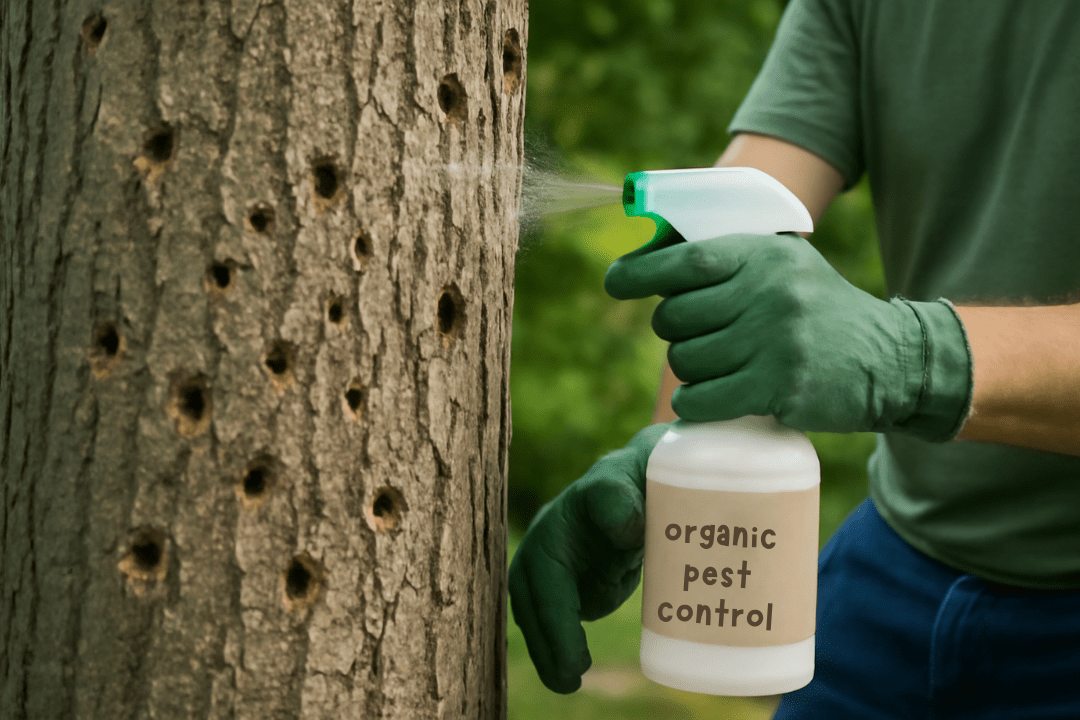
🧐 Regular Inspections 🧐
Inspect the tree regularly for signs of pests 🐞 or disease 🦠. Look for discolored 🌿 or wilted leaves 🍂, small holes in the bark 🌳, or a sticky residue around the tree 🌱, which could indicate an aphid infestation 🐜.
Tip: Early detection is key 🔑! The sooner you spot a problem 🧐, the easier it will be to manage 🛠️.
🌿 Natural Pest Control 🌿
Consider using organic solutions 🌱 like neem oil 🌿 or insecticidal soap 🧴 to control pests 🐞, rather than harsh chemicals 💀 that can harm beneficial insects 🦋.
Tip: Encourage beneficial insects 🦋, such as ladybugs 🐞, which help control aphids 🐜 and other harmful pests 🦠.
🦠 Disease Prevention 🦠
Keep the tree’s base clear of debris 🍂, as fallen leaves 🍂 or branches 🌿 can harbor fungi 🦠 or bacteria 🦠. If the tree shows signs of fungal infection 🌱, remove infected branches ✂️ immediately and treat the affected area with a fungicide 🧴.
Tip: Use mulch around the tree’s base 🍂 to help retain moisture 💧, but make sure it’s not piled up against the trunk 🌳, as this can encourage rot 🦠.
🌿 Mulching and Root Care 🌿
🍂 Mulching 🍂
Mulch helps keep the soil moist 💧, insulates the roots 🌱, and prevents weed growth 🌾. Apply a 2-4 inch layer of organic mulch 🍂, such as wood chips 🪵 or bark 🌿, around the base of the tree 🌳.
Tip: Keep the mulch a few inches away from the trunk 🌳 to prevent moisture buildup that could lead to rot 🦠.
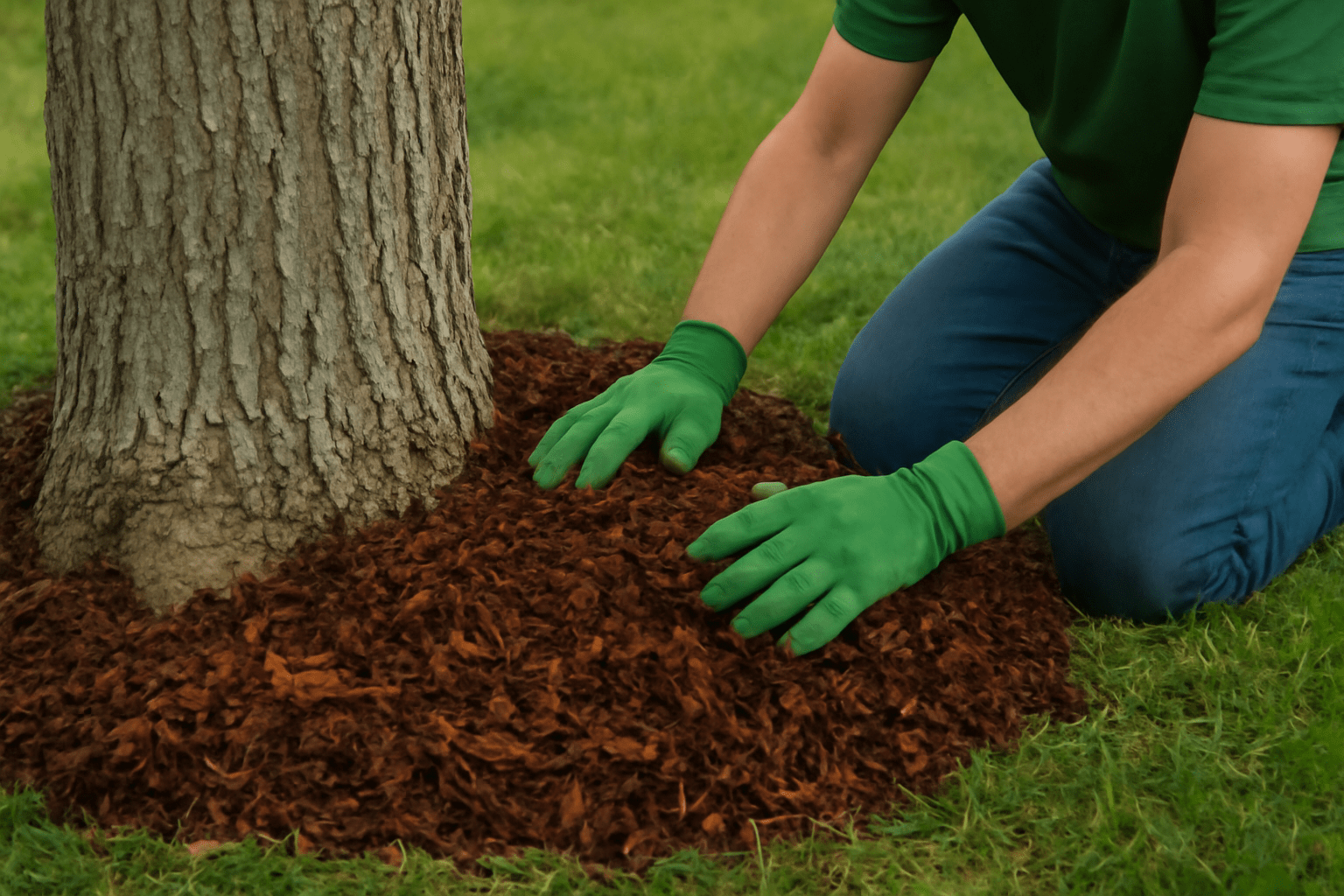
🌱 Root Care 🌱
Avoid disturbing the soil around the tree’s roots 🌳, as this can cause damage ⚠️ and interfere with nutrient uptake 🌱. If you need to aerate the soil 🌍, do so carefully using a manual aerator 🛠️ or hire a professional 👨🔧 to avoid harming the tree 🌳.
Tip: Be cautious about planting new shrubs 🌿 or flowers 🌸 too close to the tree’s roots 🌱, as this can compete for water 💧 and nutrients 🌱.
🌿 Tree Support and Stability 🌿
🦾 Supporting Weak Branches 🦾
Old hickory trees 🌳 sometimes develop weak or heavy branches 🌿 that are prone to breaking, especially during storms ⛈️. If necessary, use tree supports or cables 🔗 to help stabilize these branches 🌳.
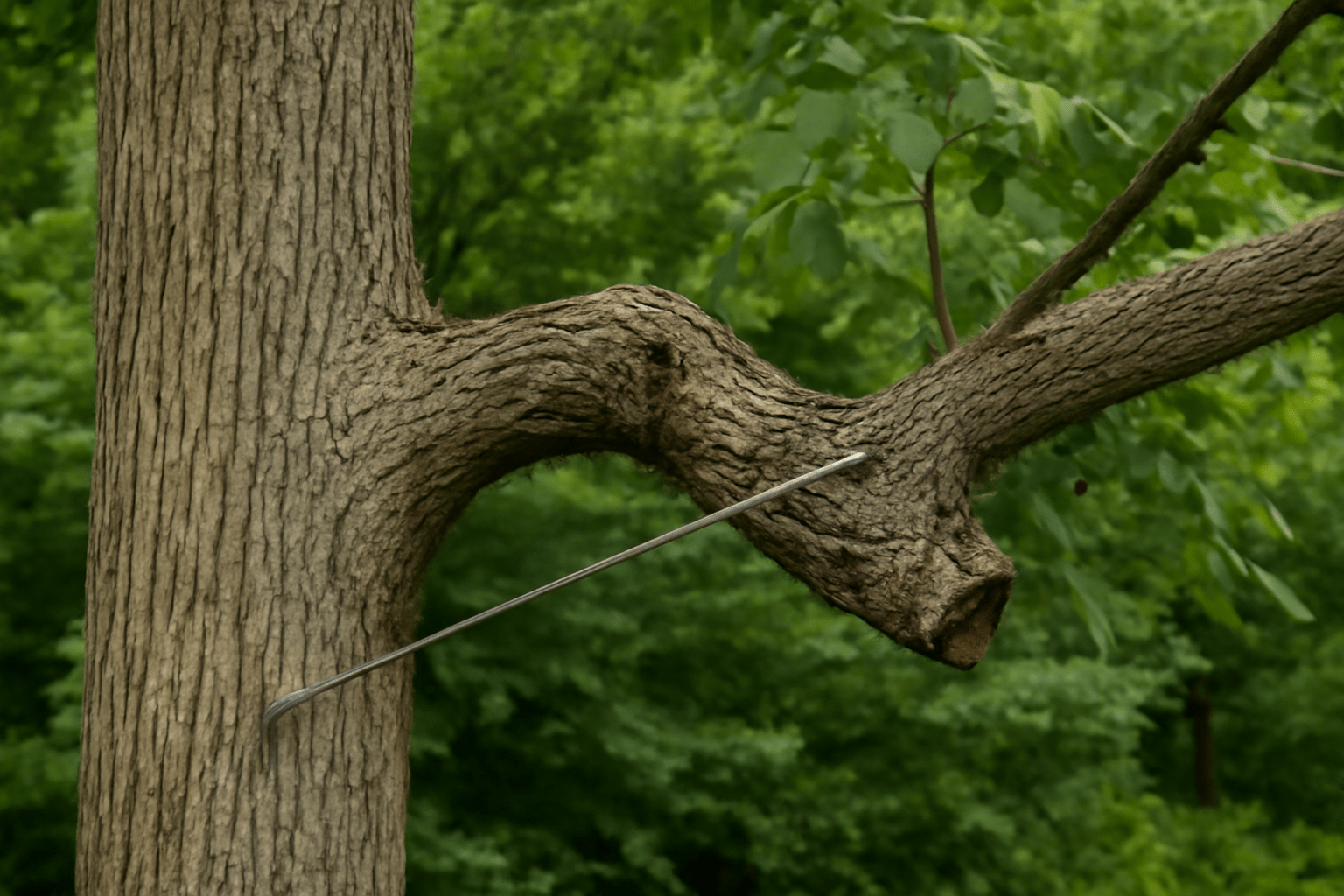
Tip: Consult an arborist 🌳 to ensure that supports are installed correctly to avoid damaging the tree further 🔧.
🌪️ Storm Protection 🌪️
If you live in an area prone to heavy winds 💨 or storms ⛈️, it’s important to ensure that the tree 🌳 is well-supported. Trim any overhanging branches 🌿 that could cause damage 🛠️, and keep the tree free of deadwood 🍂 that could be more easily blown down by the wind 🌬️.
Tip: After a storm 🌧️, inspect the tree 🌳 for any signs of damage or injury 💔 and address it immediately 🛠️.
By following these tips 🌿, you can ensure that your old hickory tree 🌳 remains a healthy, beautiful part of your landscape 🏡 for many years to come 🌱. Proper care 🌿, including regular pruning ✂️, watering 💧, and pest management 🐞, will help the tree thrive 🌳 well into its golden years 🌿.
🌳✨ Long-Term Care for Longevity ✨🌳
Old hickory trees 🌳 are resilient 💪, but they need consistent care to ensure they thrive for decades to come 🌱. Long-term care focuses on maintaining the tree’s health 🌿 and stability ⚖️, helping it to continue growing strong 💪 and healthy 🌳 throughout its life 🕰️. In this section, we’ll discuss strategies for long-term care 🛠️ that will support your tree’s longevity and vitality 🌱.
🌿 Tree Health Monitoring 🌿
🧐 Regular Inspections 🧐
Consistent monitoring 📝 is key to preventing long-term issues ⚠️. Regularly inspect your old hickory tree 🌳 for signs of disease 🦠, pests 🐞, or environmental stress 🌦️. Look for:
- Discolored or deformed leaves 🍂
- Dead or broken branches 🌳
- Visible pests 🦋 or insect damage 🐛
- Cracks in the bark 🌳 or trunk 🌱
- Wilted or yellowing leaves 🍃, especially during dry periods 🌞.
Tip: Keep a simple log 📒 of your tree’s condition and any changes you notice 🔍, so you can track its health over time 🗓️.
✅ Tree Health Checklist ✅
Every few months 🗓️, walk around the tree 🌳 and check for:
- New growth 🌱: Ensure there’s fresh growth each season 🌼.
- Leaf condition 🍃: Healthy leaves should be a vibrant green 💚.
- Root condition 🌱: If you can, check the soil around the base for signs of compaction or poor drainage 🌱.
Tip: If you notice any issues 🛑, consult a professional arborist 🌳 to get advice before the problem worsens 🦠.
🌿 Mulching and Soil Care 🌿
🍂 Consistent Mulching 🍂
Mulch not only helps retain moisture 💧 but also insulates the tree’s roots 🌱 and prevents weed growth 🌾. Apply 2-4 inches of organic mulch 🍂 around the base of the tree 🌳 each spring 🌷, but avoid piling it against the trunk 🌳.
Tip: Refresh the mulch every year 🌱, as it decomposes over time ⏳, improving soil structure 🏞️ and providing nutrients 🌿.
🏞️ Improving Soil Quality 🏞️
Old hickory trees 🌳 thrive in well-drained, slightly acidic soil 🍂. Consider periodically testing the soil around the tree 🌳 to ensure it’s in optimal condition 🌱.
Tip: If the soil is compacted 🪴, aerate it gently to improve oxygen flow to the roots 🌱.
🌱 Fertilizing 🌱
Fertilizing an old hickory tree 🌳 isn’t something you need to do frequently 🗓️, but a slow-release fertilizer in the spring 🌼 can support long-term growth 🌱. Use a balanced fertilizer with a ratio of 10-10-10 or 20-20-20 🧪.
Tip: Avoid excessive fertilization 🚫, as this can lead to weak growth 🌿 that attracts pests 🐞 and diseases 🦠.
🌿 Tree Support and Stability 🌿
💪 Strengthening Weak or Large Branches 💪
Over time 🕰️, old hickory trees 🌳 may develop branches 🌿 that are at risk of breaking 🏚️, especially during storms ⛈️. To ensure the tree’s long-term health 🌳, install support systems 🛠️ such as cabling or bracing for large, heavy branches 🌲.
Tip: Consult with an arborist 🌳 to install these systems correctly 🛠️, as improper installation can cause harm to the tree 🌳.
🌳 Tree Staking 🌳
If your old hickory tree 🌳 is leaning or unstable 💫, consider staking it 🏗️ to provide additional support. Be sure to remove the stakes once the tree has become more established 🌱 and stable 🏡.
Tip: Ensure that any staking or support doesn’t damage the bark 🌳 or restrict natural growth 🌿.
🌪️ Storm Preparation 🌪️
In areas with frequent storms 🌬️, take extra precautions ⚠️ by trimming any overhanging or weak branches 🌳 before the storm season 🌧️. This reduces the risk of limbs breaking 🌿 or falling onto structures 🏠 or people 👨👩👧👦.
Tip: After a major storm 🌧️, inspect your tree 🌳 for any signs of damage 🩹 or injury 💔 and address it immediately 🛠️.
🌿 Pest and Disease Management 🌿
🦠 Preventative Treatments 🦠
Long-term care involves preventing pest 🐞 and disease 🦠 outbreaks. Consider using organic pest treatments 🌱 like neem oil 🌿 or insecticidal soap 🧴 to manage common pests 🐞 like aphids or the hickory borer 🪲.
Tip: Regularly check for signs of pests 🐜 such as sticky residue 💧, holes in leaves 🍂, or deformed branches 🌳.
🌿 Fungal Diseases 🌿
Fungal infections 🦠 can be a significant concern for old hickory trees 🌳. Keep the area around the tree clear of fallen leaves 🍂, which can harbor fungi 🦠, and treat any fungal issues with an appropriate fungicide 🧴.
Tip: If you spot fungal infections like cankers or mildew 🌿, remove affected branches ✂️ immediately to prevent spreading 🌱.
🌞 Dealing with Stress 🌞
Old hickory trees 🌳 are more prone to stress 😓 due to environmental changes 🌍, such as drought 🌵 or extreme temperatures 🌡️. Ensure the tree gets consistent water 💧, especially during dry spells 🌞, and avoid compacting the soil around the roots 🌱.
Tip: Use a deep watering technique 💧 to reach the roots 🌱, especially during dry seasons 🌞.
🌿 Long-Term Tree Care Strategy 🌿
✂️ Pruning for Health ✂️
Regular, careful pruning ✂️ is essential for the long-term health 🌱 of your old hickory tree 🌳. Focus on removing deadwood 🌿 and damaged branches 🌲 that could cause further stress to the tree 🌳.
Tip: Always make clean cuts ✂️ and avoid removing more than 25% of the tree’s foliage 🌿 at once to prevent weakening it 🌳.
🧑🔧 Consulting an Arborist 🧑🔧
Every few years 🗓️, it’s wise to have an arborist 🌳 inspect your tree 🌳 for structural issues ⚠️ or signs of disease 🦠 that might be harder to detect 👀. They can also provide advice on any long-term care 🛠️ or corrective measures to keep the tree in optimal health 🌳.
Tip: An arborist 🌳 can help with tree risk assessments 🔎 and recommend appropriate treatments 🛠️ for specific issues 🦠.
By following these long-term care practices 🌱, your old hickory tree 🌳 will remain a healthy 🌿 and stable presence in your landscape 🏡 for many years to come 🌳. Regular monitoring 🧐, proper soil care 🌍, and timely interventions 🛠️ will ensure that your tree 🌳 continues to grow strong 💪, providing beauty 🌸 and benefits 🌱 for generations to come 🕰️.
🌳✨ Environmental Benefits of Old Hickory Trees ✨🌳
Old hickory trees 🌳 are more than just striking features in your landscape 🏡—they play a vital role in the environment 🌎. From supporting wildlife 🦋 to contributing to the fight against climate change 🌍, these trees offer numerous benefits 🌱 that extend far beyond their beautiful, towering presence 🌳. In this section, we’ll explore the environmental advantages 🌿 of having an old hickory tree in your yard or local area 🏡.

🌿 Wildlife Habitat 🌿
🦜 Shelter for Birds and Animals 🦜
Old hickory trees 🌳 provide a safe haven 🏡 for a variety of wildlife 🦋, from birds 🦜 to mammals 🦝. Their large, sturdy branches 🌿 offer a perfect perch for birds 🐦, and their leaves 🍃 and bark 🌳 serve as shelter and nesting sites for small creatures 🐿️.
Tip: You may see squirrels 🐿️, birds 🦅 like woodpeckers 🪶, and even larger animals 🦝 like raccoons 🦝 or owls 🦉 using the hickory for shelter 🌳.
🌰 Food Source 🌰
The nuts produced by hickory trees 🌳 are a valuable food source for wildlife 🦝. Squirrels 🐿️, deer 🦌, and other animals 🦇 rely on these nuts 🌰 as a part of their diet, especially in the fall 🍂 when food is more scarce 🍃.
Tip: If you have an old hickory tree 🌳, you’re supporting local wildlife 🦋 by providing them with nutritious food 🥜 and shelter 🌳.
🌿 Carbon Sequestration 🌿
🌍 Absorbing Carbon Dioxide 🌍
Like all trees 🌳, old hickory trees 🌲 are excellent at carbon sequestration 🌱—the process of absorbing and storing carbon dioxide (CO₂) from the atmosphere 🌎. This helps mitigate climate change 🌍 by removing excess CO₂, a greenhouse gas 🌡️, from the air.
Tip: The larger the tree 🌳, the more carbon it can absorb 🌿, making old hickory trees especially beneficial 🌍 in the fight against climate change 🌱.
🛑 Long-Term Carbon Storage 🛑
The larger mass 🪵 and long lifespan 🕰️ of an old hickory tree 🌳 mean it can store significant amounts of carbon in its trunk 🌳, roots 🌱, and leaves 🍃 over many decades ⏳. This storage is crucial for reducing overall atmospheric CO₂ levels 🌍.
Tip: By preserving and caring for old hickory trees 🌳, you’re contributing to the reduction of carbon emissions 🌍 and helping combat global warming 🌡️.
🌿 Soil Health and Erosion Control 🌿
🏞️ Soil Enrichment 🏞️
The roots 🌱 of old hickory trees 🌳 help enrich the soil 🌍 by breaking up compacted layers 🌿 and promoting better water infiltration 💧. The tree’s leaf litter 🍂, which decomposes on the forest floor 🌳, adds organic material 🪴, improving soil fertility 🌱.
Tip: Hickory trees 🌳 help create rich, healthy soil 🌍, which benefits not only the tree 🌳 but also the surrounding plants 🌱 and ecosystem 🌿.
🪵 Preventing Soil Erosion 🪵
Old hickory trees 🌳, with their strong root systems 🌱, are incredibly effective at preventing soil erosion 🌍. Their deep roots stabilize the soil 🏞️, especially on slopes ⛰️ or areas prone to runoff 💧.
Tip: If your hickory tree 🌳 is planted in an area with erosion concerns 🌱, its presence can help protect against the loss of topsoil 🪴, which is crucial for maintaining healthy land 🌍.
🌿 Air Quality Improvement 🌿
🌬️ Oxygen Production 🌬️
Like all trees 🌳, old hickory trees 🌳 are excellent at producing oxygen 💨 through the process of photosynthesis 🌿. They take in carbon dioxide 💨 and release oxygen 🌱, improving the air quality 🌞 in your local area 🏡.
Tip: A mature hickory tree 🌳 can produce enough oxygen 🌬️ to support several people 👨👩👧👦, improving air quality 🌱 and contributing to a healthier environment 🌍.
🌿 Filtering Pollutants 🌿
Trees 🌳 also help reduce air pollution by filtering out harmful particles 🏭 such as dust 🌬️, pollutants 💨, and toxins 🦠. As they absorb these pollutants 🦠, old hickory trees 🌳 improve the overall air quality 🌱 around them.
Tip: Having an old hickory tree 🌳 in an urban 🌆 or suburban 🌳 area can help combat the effects of air pollution 🌬️, benefiting both human and environmental health 🏡.
🌿 Aesthetic and Psychological Benefits 🌿
🌳 Enhancing Landscapes 🌳
Old hickory trees 🌳 are a beautiful addition 🌸 to any landscape 🏡, providing shade 🌳, texture 🌱, and seasonal beauty 🌼. Their towering presence adds grandeur to gardens 🏡, parks 🌳, and natural areas 🌲.
Tip: These trees 🌳 are perfect for creating a natural focal point 🌳, improving the overall aesthetic 🌸 of your outdoor spaces 🌿.
🌿 Mental Health Benefits 🌿
Spending time around trees 🌳 has been shown to have positive effects on mental health 🧘♀️. The presence of an old hickory tree 🌳 can promote feelings of peace 🕊️, calm 🧘♂️, and relaxation 🌱, reducing stress 😌 and improving overall well-being 🌿.
Tip: If you’re looking to improve your outdoor space for relaxation 🌿, an old hickory tree 🌳 can help create a tranquil, restorative environment 🌳.
🌱 Why Old Hickory Trees Matter 🌱
The environmental benefits 🌍 of old hickory trees 🌳 are undeniable 🌿. Not only do they provide shelter 🏡 and food 🍃 for wildlife 🦋, but they also play a key role in improving air quality 🌬️, preventing soil erosion 🌍, and combating climate change 🌍 through carbon sequestration 🌱. By caring for these magnificent trees 🌳, you’re making a lasting positive impact 🌎 on your environment—and future generations 🌱 will thank you for it! 💚
🌳✨ Final Thoughts ✨🌳
Old hickory trees 🌳 are truly remarkable 🌟. Beyond their towering beauty 🏞️ and majestic presence 🌳, they provide essential environmental benefits 🌱, support wildlife 🦋, and play a crucial role in maintaining healthy ecosystems 🌿. By understanding how to identify 🔍 and care for these incredible trees 🌳, you can ensure they continue to thrive 🌱 for years to come, enriching your landscape 🏡 and the planet 🌍.

Whether you’re managing one in your backyard 🌳 or simply appreciating them in nature 🌳, taking proactive steps to protect 🛡️ and nurture old hickory trees 🌿 is an investment in both the environment 🌍 and the future ⏳. With the right care 💚, these timeless giants 🌳 will continue to offer beauty 🌸, shade 🌳, and invaluable ecological benefits 🌿 long into the future 🌞.
Let’s keep our old hickory trees 🌳 strong 💪, healthy 🍃, and standing tall 🌳—because they’re not just part of our environment 🌎; they’re a vital part of our shared future 🌍. 🌿💚
🌳✨ Frequently Asked Questions (FAQs) ✨🌳
How do I identify an old hickory tree?
Old hickory trees are easily recognized by their rough, shaggy bark that peels in long strips and their large, spreading canopy. They have compound leaves with jagged edges and produce small, hard nuts. Additionally, an old hickory can grow up to 100 feet tall, and its trunk will often be thick and sturdy.
What are the signs of disease in an old hickory tree?
Look for wilting leaves, blackened or sunken areas on the bark, or branches with no new growth. Hickory dieback, canker diseases, and powdery mildew are common in older trees. If you spot any of these symptoms, consult an arborist for treatment.
When is the best time to prune an old hickory tree?
Prune your old hickory tree in late winter or early spring while it’s dormant. This helps minimize stress and reduces the risk of disease. Avoid pruning during the growing season to protect the tree from injury and sap loss.
How can I improve the soil for my old hickory tree?
Ensure the soil is well-drained and slightly acidic. Consider adding organic compost to enrich the soil and promote root health. If soil is compacted, gently aerate the area around the tree to improve root oxygenation and water flow.
How much water does an old hickory tree need?
Old hickory trees prefer deep watering. Water once a week during dry spells, ensuring the water reaches the deeper roots. Be mindful not to overwater, as it can lead to root rot. Ensure good drainage around the base of the tree.
What pests should I watch out for in an old hickory tree?
Common pests include the hickory borer, aphids, and caterpillars. These pests can damage the tree by feeding on its leaves or bark. Regularly check for holes in the bark, yellowing leaves, or a sticky residue, which could indicate an infestation.
How can I protect my old hickory tree from storms?
Trim any dead or weak branches before the storm season to reduce the risk of breakage. For large or heavy branches, consider installing tree supports or cabling to provide extra stability. After storms, inspect the tree for damage and prune any broken branches.
How do I know if my old hickory tree is still healthy?
A healthy hickory tree shows signs of new growth in the spring, vibrant green leaves in summer, and strong branches. If the tree has slow or no growth, yellowing leaves, or signs of decay in the bark, it may need extra care. Regular inspections will help catch any issues early.
